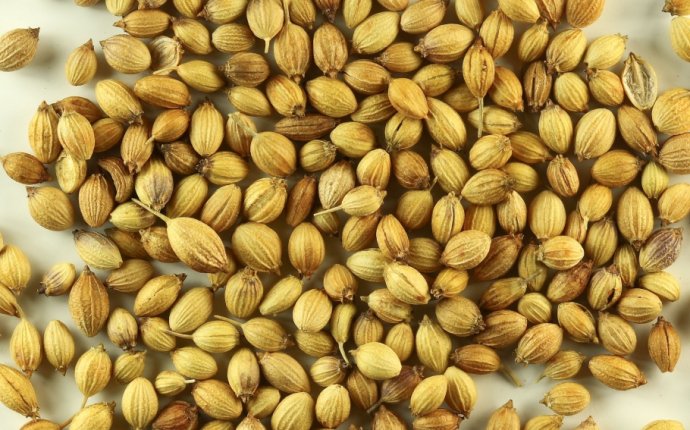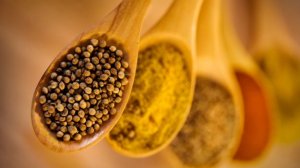
Coriander seeds Ayurveda
 Coriander, popularly known as dhania in India, is extensively used across various regional cuisines to flavour curries, stir fries, snacks, breakfast items – you name it! It is popular in Mexico and the south western part of USA too, where it is utilised in salsas and mixed greens to burritos and meat dishes. While the fresh leaves are commonly topped on most dishes, the seeds and a ground powder (masala) are also used in cooking. The leaves are often used raw and added to the dish just before serving as heat tends to lessen its flavour rapidly.
Coriander, popularly known as dhania in India, is extensively used across various regional cuisines to flavour curries, stir fries, snacks, breakfast items – you name it! It is popular in Mexico and the south western part of USA too, where it is utilised in salsas and mixed greens to burritos and meat dishes. While the fresh leaves are commonly topped on most dishes, the seeds and a ground powder (masala) are also used in cooking. The leaves are often used raw and added to the dish just before serving as heat tends to lessen its flavour rapidly.
Coriander is a flowering plant that belongs to the parsley family (leaves of coriander and parsley have comparative shape and size). It is said to have originated from South Europe, North Africa and West Asia. Coriander was also one of the numerous plants cultivated in the Hanging Gardens of Babylon. It was well known and regularly consumed in Ancient Egypt and Greece, and is still among the most popular flavour boosters used in preparing various dishes across the globe.
 Coriander seeds are plump and brown in colour, have a hollow cavity which bears essential oils that lend to the flavour of the dishes when used in cooking. They are harvested when the plant turns brown and its leaves start to dry and fall. Immature seeds are light green in colour and taste quite bitter. Apart from being a popular spice in the kitchen, coriander seeds are also known for their medicinal properties.
Coriander seeds are plump and brown in colour, have a hollow cavity which bears essential oils that lend to the flavour of the dishes when used in cooking. They are harvested when the plant turns brown and its leaves start to dry and fall. Immature seeds are light green in colour and taste quite bitter. Apart from being a popular spice in the kitchen, coriander seeds are also known for their medicinal properties.
In Ayurveda, it is often recommended for stomach related ailments, as it is known to ease digestion. It is indeed a super seed and its regular use can bring about various health benefits. Here are some reasons for you to include it in your daily diet -
 1. Beautiful Skin
1. Beautiful Skin
According to a research done by the California University of Ayurveda, coriander seeds are quite effective in curing different skin ailments like eczema, itchy skin, rashes and inflammation as they have antiseptic properties. They are known to cure mouth ulcers and sores as well. The seeds contain linoleic acid that also has pain relieving properties to diminish irritation.
3. Facilitates Hair Growth
Hair loss can come about because of debilitated hair follicles, hormonal imbalance and stress, in addition to an improper diet. Coriander seeds are known to prevent hair fall and invigorate the roots for the development of new hair. They fortify the hair follicles and initiate further development, in this way keeping under control your hair fall issues.
 4. Better digestion
4. Better digestion
According to Amol Ghosh, Clinical Tutor (Rtd), N.R.S. Hospial, Kolkata, “Coriander seeds have anti-oxidant properties and dietary fiber that advance the healthy working of the liver and facilitate bowel moments. They help in the generation of digestive compounds and juices that facilitate the procedure of digestion. In the event that you experience some indigestion, try and add coriander seeds in your diet. You will definitely notice a difference.”
Dr Rupali Datta, Chief Nutritionist of SmartCooky says, "Coriander seeds add an extremely pleasant flavour to the food, and they help in the process of digestion. They are also good sources of fiber, phosphorus and calcium."
 5. Keeps a Check on Cholesterol
5. Keeps a Check on Cholesterol
Cholesterol levels or your lipid profiles are regularly a state of worry during check-ups. Furthermore, if you need to bring down your cholesterol levels and keep a check, coriander seeds could help you. According to Indrani Subramanian, Apollo Hospitals, Kolkata, “Coriander seeds contain a compound called coriandrin that controls the process of lipid digestion, as a result bringing down our cholesterol levels. As per Ayurveda, the seeds have potent effect on the way the body digests food and absorbs fat, making it a common recommendation to keep cholesterol levels under control.
6. Cure for Cold and Flu
Vitamin C is a powerful antioxidant that is crucial for a sound body and beautiful skin. Coriander seeds have numerous key vitamins like folic acid, vitamin A and beta-carotene, and most importantly, vitamin C. According to Madhavi Rathod of Vedic Healing, coriander leaves and seeds contain nearly 30% of the everyday suggested measure of vitamin C, which helps in curing cold and flu.














